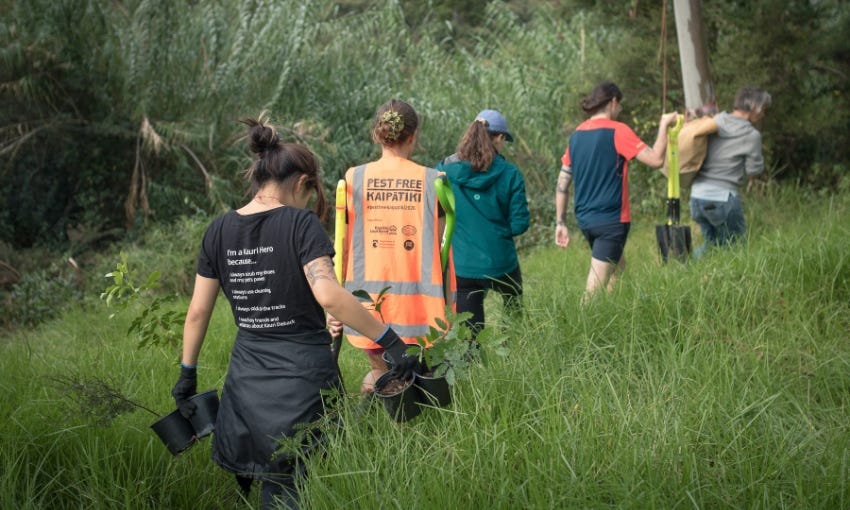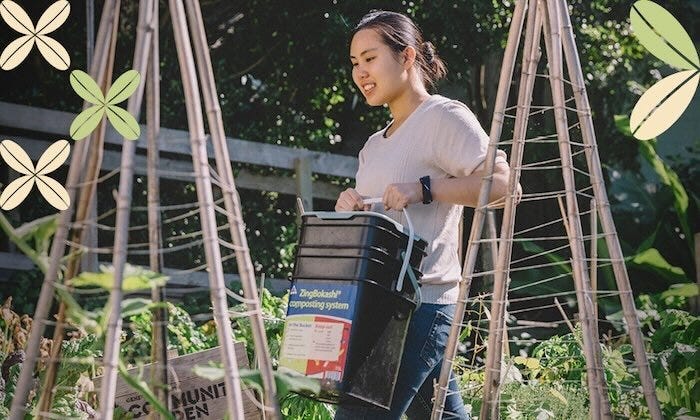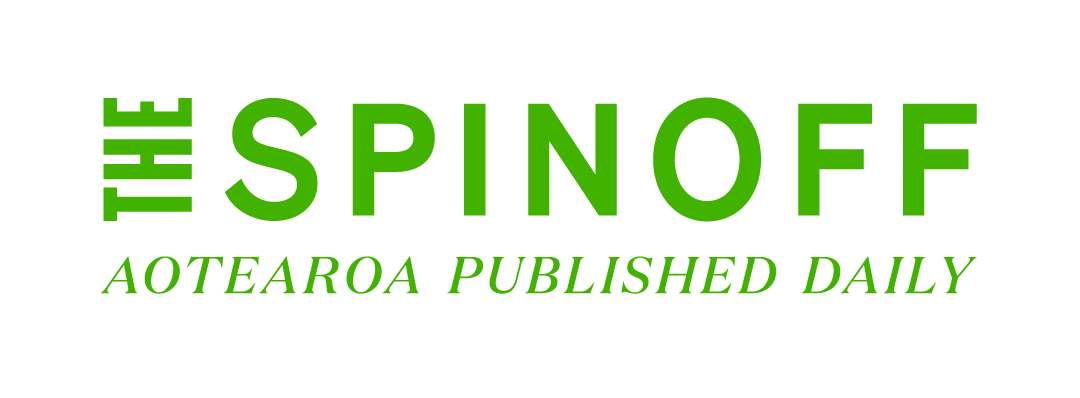Kia ora, welcome to Future Proof. I’m Ellen, thanks for joining me this week.
Image credit: Pest Free Kaipātiki.
When the world feels big and bad and slippery, there’s solace in shrinking your sphere down to just one place. Focusing on making your corner a teeny bit better is a path to feeling like maybe things aren’t all bad, and maybe we aren’t all doomed.
This idea is in action on the North Shore of Auckland, where a consortium of conservation groups unites under the banner of the Pest Free Kaipātiki Restoration Society (PFK).
“We want to say, you can act and you can make a difference on a small scale,” says Annie Dignan, general manager of PFK.
PFK’s pioneering halo model
The project divvies up Kaipātiki into 18 “bite-sized” pieces, each centred on a reserve and surrounded by a “halo”. These pockets of urban nature are a lifeline for the city’s wildlife and people alike.
“I describe it as a predator-proof fence, without the fence. It’s neighbours holding hands around that reserve,” says Dignan.
Activities in each halo area are shaped and driven by the local community, with PFK’s role to reduce barriers and enable action. For some people, it’s about eradicating pest plants like woolly nightshade – which can cause asthma-like symptoms. For others, they might want improved seating in their reserve. For others still, it’s about the predators: getting rid of the rats and the possums, and bringing back the birds.
“If I hear we’ve got a rat problem in Auckland, it’s like someone’s pulled the batteries out of me. It’s just too big,” says Dignan. “When it’s bite-sized, I can act. We do try and remove that sense of being overwhelmed.”
‘A connected community is a resilient community’
Beyond the return of birds like banded rails and kākā, PFK and its halo projects foster community connection: “that wellbeing stuff, health, a sense of purpose… I literally had someone say that he thinks our organisation saved his life,” says Dignan. She also credits the halo work with linking her own family to their neighbours, who then stepped in to help when her home began to flood during last year’s extreme wet.
Like many volunteer organisations, attracting younger and diverse folks can be a challenge. Some of the halo projects have volunteers who’ve been protecting and restoring their local patch for 45 years – “an amazing gift,” says Dignan. Initiatives like community events, flexible timing and tasks, and reaching out in Mandarin, are helping to engage new volunteers.
“Even if you’ve got no interest in pulling out a moth plant, you can still support an environmental organisation,” says Dignan. “It’s about this being a place we want to live in.”
How to compost for every living situation
You don’t have to have green thumbs – or a garden – to compost your food scraps. From apartment living to lifestyle blocks, there are many different ways to make composting fit into your space.
Read about the best option for you on The Spinoff now, brought to you in paid partnership with Auckland Council Compost Collective.
Yes, Hector’s dolphins are an endangered species
The SailGP race in Lyttelton Harbour was cancelled on Saturday after a Hector’s dolphin was spotted on the course. Subsequently, SailGP boss Sir Russell Coutts levelled fiery criticism at the harbourmaster, iwi, decisionmakers, and a dolphin scientist over what he perceived as “red tape”. The high-speed sailing race, held in a marine mammal sanctuary during dolphin calving season, was subject to a marine mammal management plan (that was ignored in last year’s race). Coutts also claimed that Hector’s dolphins are not an endangered species, a demonstrably false statement that dolphin scientist Professor Liz Slooten “couldn’t quite believe”. Hector’s dolphins are listed as “Endangered” on the International Union for Conservation of Nature’s Redlist. They’re also classified on New Zealand’s threatened species list as “Nationally Vulnerable”.
Which projects are on the fast track? That’s a secret
The projects that are part of the controversial new Fast Track Approvals Bill remain under wraps, Rebekah White reports for New Zealand Geographic. In this explainer, White explores what you could do – hypothetically – under the new legislation. “Could I carve my own Mt Rushmore-style depiction of the two ministers responsible for the bill into one of the Southern Alps? Yes, so long as I picked one that wasn’t in a national park, or on the list of off-limits places,” she writes. RNZ’s Farah Hancock also has a useful explainer, highlighting the key differences between this new bill and the previous government’s fast track rules. Public submissions on the bill close on 19 April, and if it passes, the public won’t have a say on (the currently secret) individual projects listed in the bill.
Remembering environmentalist Rod Oram
Prominent climate and environmental journalist Rod Oram died suddenly last week after a cycling accident. Oram was most recently a columnist at Newsroom, writing engagingly at the intersection of the climate and ecological crises and the economy. Like many of you, I deeply appreciated his well-argued and clear-eyed insights, including recent reporting from the international climate summit, and a 10-part series on climate change, The Way Forward. Oram’s passing is a huge loss for Aotearoa journalism and environmentalism. Deepest condolences to his family, friends and colleagues.
Right now, we need your support more than ever
The Spinoff recently estimated that the number of full-time journalists in New Zealand may have halved since 2018 Census data was published. As the media landscape continues to change, numbers may decrease again. The Spinoff is not immune to the drastic advertising slowdown impacting the sector. That’s why we’re immensely grateful to our audience for their support. To those who already support us, thank you. If you don’t and are able, we’d be very grateful if you’d consider becoming a Spinoff member or donating today.
– Duncan Greive, Founder
More stories
More tales on two wheels as told to Shanti Mathias, this time from cycling around east Auckland.
Western Australia banned plastic coffee cups earlier this month, with South Australia to follow suit in September.
A real-time carbon map inspired students to swap car drop-offs for walking or riding to school.
New Greens co-leader Chlöe Swarbrick is keen to take on the climate portfolio – and to inspire a wider public movement for climate action.
Hector’s dolphins are indeed an endangered species, despite what the SailGP boss thinks.
The $1.2 billion Jobs for Nature funding – which has fuelled pest control, forest restoration and freshwater projects since 2020 – is in its final stretch. The Detail podcast speaks to projects scrambling for funding to keep vital conservation work going.
In the US, the Biden administration has introduced new regulations that would phase out petrol cars by 2032.
French lawmakers have introduced a new bill targeting fast fashion, including an environmental surcharge.
Urban veggie gardens might be more carbon intensive than you think, according to a new study that has vexed home gardeners.
Vanuatu’s bid to hold climate polluters to account in the International Court of Justice is progressing, Isobel Ewing reports.
Vito the Argentine ant detection dog. Image credit: Department of Conservation.
To finish this issue, a resounding “GOOD BOY” for Vito the conservation dog, who prevented a potential “antpocalypse” on predator-free Matiu/Somes Island in Wellington earlier this month. Vito is specially trained to detect invasive Argentine ants, and he found a colony chocka with the pests in close proximity to building material bound for the island. In other news, the (human) New Zealand Environmental Hero of the Year will be announced tonight – read about the three wonderful finalists here.
A round of a-paws for Vito and our environmental heroes,
Ellen
Future Proof is looking for a sponsor!
Connect your brand with an insightful exploration of environmental news, reaching influential readers committed to sustainability and staying informed about the state of our natural world. Contact commercial@thespinoff.co.nz to learn more.
Got some feedback about Future Proof or topics you’d like covered? Get in touch with me at futureproof@thespinoff.co.nz













I was so shocked when I heard that Rod Oram had died. It felt like losing a friend. I used to read everything that he wrote and admired his unquenchable optimism as much as his profound and detailed knowledge. His loss is a real blow for those trying to protect our planet from economic despoliation.